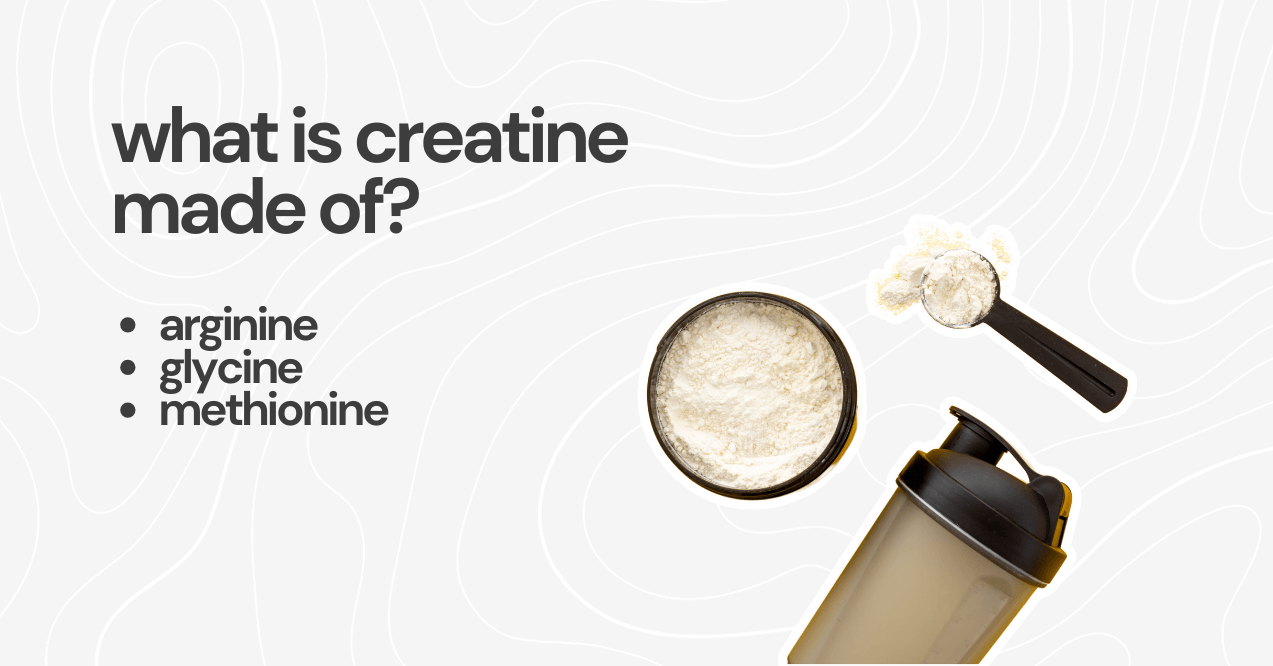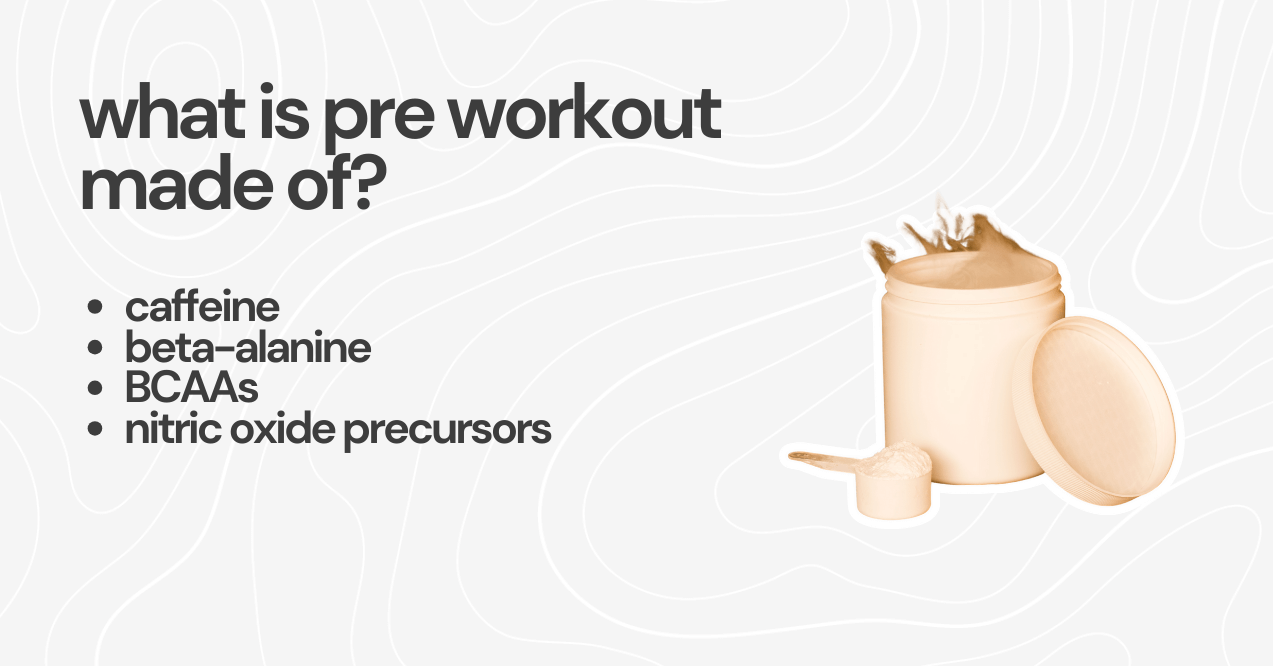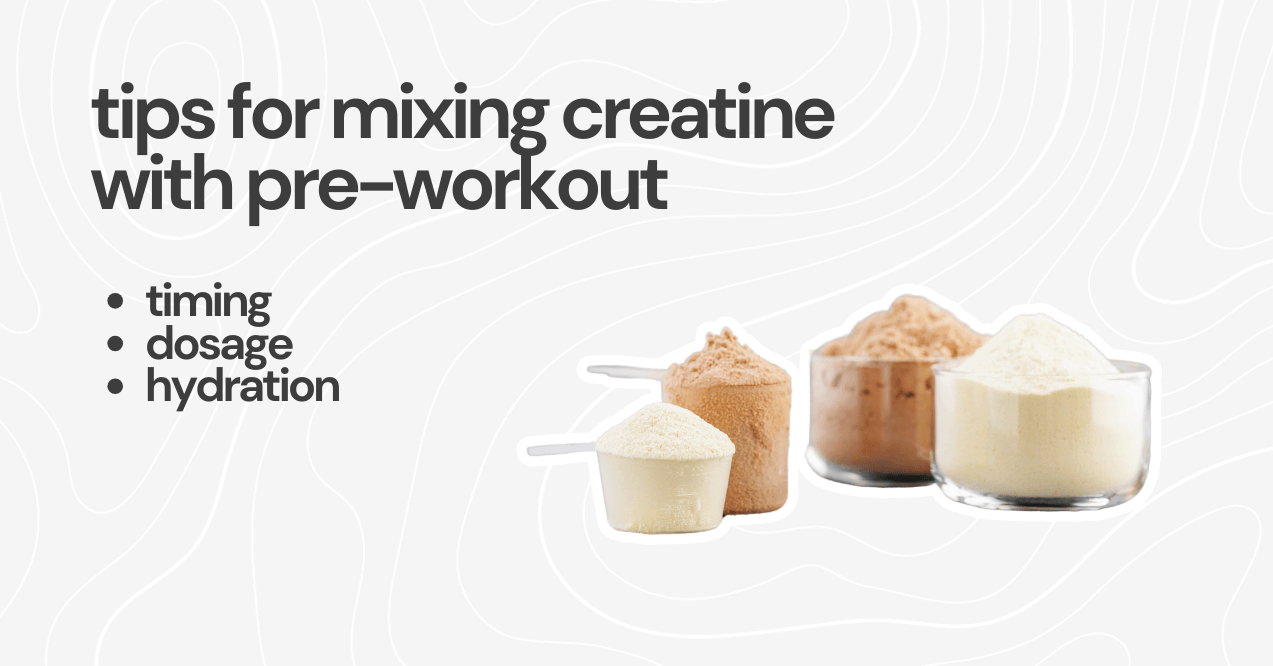Can You Mix Creatine With Pre Workout Together?
Hey there, fitness enthusiasts! Looking to level up your workouts and wondering if you can mix creatine with pre-workout together?
Well, you’re in the right place! In this article, we’ll break down everything you need to know about combining these two powerhouse supplements. Creatine supplements are known for boosting strength and aiding muscle recovery, making them a key component in any muscle gain stack. But can combining creatine with pre-workout give you an extra edge?
Get ready to learn some awesome tips and tricks to maximize your workout performance!
Key Article Findings:
What Is Creatine Made Of?
First things first, let’s talk about creatine. This naturally occurring compound is found in your muscle cells and helps them produce energy during heavy lifting or high-intensity exercise.

Creatine is composed of three key amino acids, each playing a vital role in muscle performance and recovery:
- Arginine – An essential amino acid that supports protein synthesis and boosts nitric oxide production, which helps improve blood flow and muscle endurance.
- Glycine – A non-essential amino acid that contributes to the formation of proteins and supports metabolic functions.
- Methionine – An essential amino acid crucial for tissue growth, repair, and the production of key molecules like S-adenosylmethionine (SAMe), which contributes to cellular function.
Together, these building blocks form a powerful compound that fuels your muscles and enhances athletic performance. While standard creatine monohydrate is effective, some people prefer micronized creatine for its improved solubility and absorption, making it easier to mix into liquids without clumping.
For those seeking a creatine supplement to enhance both fitness and overall health, trumeta creatine is worth considering. It may be one of the best supplements for energy to help you stay active through long work hours, increase muscle mass, and speed up post-exercise recovery.
Additionally, some users report improved mental clarity. With trumeta creatine, you can make every moment count, whether tackling work challenges, pursuing passion projects, or simply making the most of each day.

Now, you might be wondering, does creatine make you bloated? Some people do experience bloating after a workout when they first start taking creatine supplements, but this usually goes away after a few days as your body adjusts. Drinking plenty of water can help minimize any bloating or discomfort.
What Is Pre Workout Made Of?
Next up, let’s explore how do pre-workout supplements feel like. These supplements are designed to enhance your physical performance, endurance, and focus during workouts. Pre-workout supplements often contain a blend of ingredients that work together to give you that extra edge.

Pre-workout supplements are packed with powerful ingredients designed to enhance performance. Here’s a breakdown of the key players:
- Caffeine – A well-known stimulant that boosts alertness, reduces fatigue, and enhances overall workout performance.
- Beta-alanine – Helps buffer lactic acid buildup in muscles, allowing you to push through high-intensity workouts for longer.
- BCAAs (Branched-Chain Amino Acids) – Essential for muscle growth and recovery, helping to reduce muscle breakdown during exercise.
- Nitric oxide precursors (e.g., L-arginine, L-citrulline) – Improve blood flow to muscles, increasing oxygen and nutrient delivery for better endurance and strength.
You might be curious about how long does pre workout last. The effects of pre-workout supplements can vary depending on the individual and the specific product, but generally, they kick in about 30-45 minutes after consumption and can last for several hours.

Can You Mix Creatine With Pre Workout Together?
Now for the big question: Can you mix creatine with pre-workout? The answer is yes! Combining these two supplements can provide impressive benefits, such as enhanced energy production, muscle endurance, and strength, helping you push through tough workouts and reach your fitness goals faster.
However, there are a few important factors to keep in mind when mixing them:
- Stick to Recommended Dosages – More isn’t always better. Taking too much creatine or pre-workout can lead to unwanted side effects. Always follow the serving sizes listed on product labels.
- Listen to Your Body – Everyone reacts differently to supplements. If you experience discomfort, digestive issues, or other unusual symptoms, stop using them and consult a healthcare professional.
- Stay Hydrated – Creatine and pre-workout can increase your body’s hydration needs. Drink plenty of water throughout the day to support optimal performance and prevent potential side effects.
- Check for Creatine in Your Pre-Workout – Some pre-workout formulas already contain creatine, so be sure to read the label before adding extra. This helps prevent exceeding the recommended daily intake.
When used correctly, creatine and pre-workout can complement each other, giving you the strength and stamina to power through even the most intense training sessions.
Tips for Mixing Creatine With Pre-workout

If you’re ready to mix creatine with pre-workout, here are some expert tips to maximize your results while staying safe and effective:
1. Timing Matters
- Take your pre-workout supplement 30-45 minutes before exercise to allow the ingredients to activate. This ensures you get the energy boost and endurance benefits right when you need them.
- Creatine timing is flexible—you can take it before or after your workout. Some prefer pre-workout creatine for added strength, while others take it post-workout to support muscle recovery.
2. Stick to the Right Dosage
- The recommended creatine dosage is 3-5 grams per day for optimal performance and muscle support.
- For pre-workout, always follow the serving size listed on the label. More doesn’t mean better—exceeding recommended amounts can lead to unwanted side effects.
3. Prioritize Hydration
- Hydration is crucial! Creatine and pre-workout can increase your body’s need for water, so aim for at least 8-10 glasses daily to stay hydrated and maintain peak performance.
- Proper hydration also helps reduce potential side effects like cramps, fatigue, or bloating from creatine supplementation.
By timing your intake correctly, sticking to proper dosages, and staying hydrated, you can safely combine creatine and pre-workout to unlock better strength, endurance, and recovery.
What are the Risks of Taking Creatine with Pre Workout Together?
While mixing creatine with pre-workout can offer some awesome benefits, it’s important to be aware of the potential risks. Here are a few things to watch out for:
- Dehydration – Both creatine and pre-workout supplements can increase your body’s need for water. If you don’t stay properly hydrated, you may experience symptoms like headaches, dizziness, and fatigue.
- Gastrointestinal distress – Some people may experience stomach discomfort, bloating, or diarrhea when taking creatine or pre-workout supplements. If this happens, try reducing your dosage or splitting it into smaller servings throughout the day.
- Increased heart rate – Pre-workout supplements often contain stimulants like caffeine, which can cause an increase in heart rate. If you have a pre-existing heart condition or are sensitive to stimulants, consult with a healthcare professional before using these supplements.
Conclusion
So, can you mix creatine with pre-workout? Absolutely! Combining these two supplements can help enhance strength, endurance, and recovery, giving you an extra edge in your fitness journey.
Just remember these key takeaways:
- Follow the recommended dosages – Stick to 3-5g of creatine daily and follow the pre-workout serving size on the label.
- Stay hydrated – Drink plenty of water to support performance and prevent dehydration.
- Listen to your body – If you experience any discomfort, adjust your intake or consult a professional.
- Check your labels – Some pre-workout formulas already contain creatine, so be mindful of your total intake.
By keeping these tips in mind, you’ll be on track to maximize your workout performance and achieve the results you’ve been striving for.
So, what are you waiting for? Fine-tune your supplement routine and power up your next workout!
avoid mixing creatine with caffeine and alcohol. Caffeine may counteract creatine’s effectiveness, while alcohol can dehydrate you, potentially exacerbating creatine’s side effects. Stick to water, protein shakes, or juice to ensure optimal absorption and benefits.
for most healthy individuals, up to 5 grams of creatine per day is safe and does not harm the kidneys. However, those with pre-existing kidney conditions should consult a healthcare professional before starting creatine supplementation.
Creatine is a compound that boosts muscle energy production and enhances strength. Difference between creatine and pre workout is that pre-workout supplements are blends of various ingredients designed to improve performance, endurance, and focus during workouts. They often contain stimulants like caffeine.
No, pre-workout is not creatine. Pre-workout supplements may contain creatine as one of their ingredients, but they are broader formulations designed to boost overall workout performance, including energy, endurance, and focus, not just muscle energy.
Advertisement. This site offers health, wellness, fitness and nutritional information and is designed for educational purposes only. You should not rely on this information as a substitute for, nor does it replace, professional medical advice, diagnosis, or treatment. If you have any concerns or questions about your health, you should always consult with a physician or other health-care professional. Do not disregard, avoid or delay obtaining medical or health related advice from your health-care professional because of something you may have read on this site. The use of any information provided on this site is solely at your own risk.







